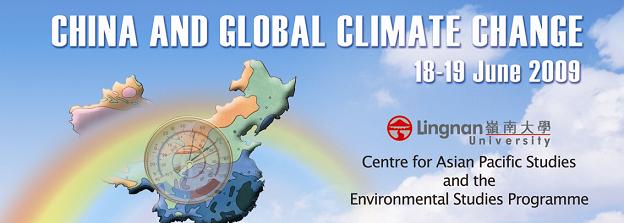
Event Title
Conference on China and Global Climate Change : Reconciling International Fairness and Protection of the Atmospheric Commons
Location
AM310, Lingnan University
Start Date
19-6-2009 11:00 AM
End Date
19-6-2009 12:30 PM
Language
English
Description
China is likely already seeing the effects of climate change. Further effects in the form of increased temperatures, changing precipitation patterns, and rising sea levels could be catastrophic, making action at all levels an urgent priority. While much attention is rightfully paid to reducing carbon emissions from fossil fuels, land management practices account for as much as a quarter of the net increase in greenhouse gasses. In China, urbanization is the most important and tractable phenomenon affecting the landscape, reducing carbon sequestration, as well as locking in transportation patterns that assume increasing fossil fuel use into the future. Developing systems for carbon-negative land management will have benefits at the local and global scales, serving as an insurance policy against the increasingly negative consequences of climate change
In this paper, I review the linkage between land use patterns and climate change. In China, central government policies aimed at curbing urban expansion and preserving agricultural land have faced difficulties in implementation, as local officials respond to other policy signals and economic incentives. A review of the local effects of climate change on some of China’s most prosperous regions suggests that, if these were properly accounted for, many local leaders could see net benefits from investing in carbon-negative land management. I conclude by considering some policy reforms that can be taken by local and central governments to promote beneficial practices at multiple levels.
Document Type
Discussion
Recommended Citation
Henderson, M. (2009). Land use and climate change: effects and solutions at the local level. In China and global climate change: Proceedings of the conference held at Lingnan University, Hong Kong, 18-19 June 2009 (pp. 516-529). Centre for Asian Pacific Studies and the Environmental Studies Programme, Lingnan University, Hong Kong.
Included in
Land use and climate change : effects and solutions at the local level
AM310, Lingnan University
China is likely already seeing the effects of climate change. Further effects in the form of increased temperatures, changing precipitation patterns, and rising sea levels could be catastrophic, making action at all levels an urgent priority. While much attention is rightfully paid to reducing carbon emissions from fossil fuels, land management practices account for as much as a quarter of the net increase in greenhouse gasses. In China, urbanization is the most important and tractable phenomenon affecting the landscape, reducing carbon sequestration, as well as locking in transportation patterns that assume increasing fossil fuel use into the future. Developing systems for carbon-negative land management will have benefits at the local and global scales, serving as an insurance policy against the increasingly negative consequences of climate change
In this paper, I review the linkage between land use patterns and climate change. In China, central government policies aimed at curbing urban expansion and preserving agricultural land have faced difficulties in implementation, as local officials respond to other policy signals and economic incentives. A review of the local effects of climate change on some of China’s most prosperous regions suggests that, if these were properly accounted for, many local leaders could see net benefits from investing in carbon-negative land management. I conclude by considering some policy reforms that can be taken by local and central governments to promote beneficial practices at multiple levels.

